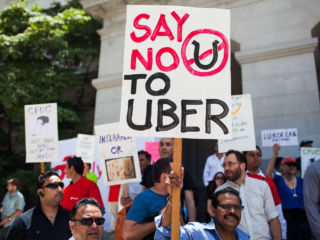How many times have you seen businesses that have generic brand values? The kind of values that sit on the wall of a beige company reception, mumbling the words integrity, trust, and respect under their breath and expecting their people to embody them, and their customers to believe in them?
Now, don’t get me wrong, there’s nothing wrong with any of those words, of course, but are they ownable, authentic, or actionable? Will they do any good for the business? Will they do anything at all?
Created and embedded properly, brand values can be a catalyst for creating a positive culture and experiences for employees and customers alike. But on the flip side, they can also drive brands in the wrong direction, which is exactly what happened to Uber in 2017.
In this post, we’ll look at how Uber used its brand values to turn things around.

When brand values drive you in the wrong direction
Founded in 2009, Uber is a brand whose growth, success, and failures have been scrutinized and well-documented by the world’s business communities and press. Today, Uber transports approximately 100m users from A to B, in more than 10,000 cities around the world. But despite its scale, Uber hasn’t always been seen as a trustworthy brand and has certainly had its integrity questioned by many of its potential customers.
Back in 2017 while still under the steer of Travis Kalanick, the founding CEO, Uber had its most controversial year.
A year that saw the company accused of having a toxic culture, rife with misogyny, sexual harassment, and abuse, all of which triggered an investigation led by the former US attorney general Eric Holder, with the damning findings of that report leading to the resignation and terminations of several senior leaders, and a promised reform of its business practices.
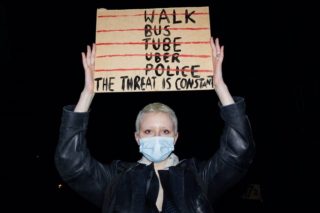
At the core of this controversy was Uber’s culture. In one opinion piece in the FT called Why Uber has been forced to U-turn, Leslie Hook, San Francisco correspondent for the FT said, “Uber takes its unusual values so seriously that, in the past, it guarded them as corporate secrets (even though they subsequently leaked out)…Secret or not, those values happened to be the wrong ones…”
Leslie went on to say, “One of their findings was that Uber’s values had ‘been used to justify poor behaviour’, and that the company should ‘eliminate’ or ‘reformulate’ them”.
It’s not hard to see why, given that their values included phrases such as “Super pumped”, “Meritocracy”, “Toe-stepping”, “Always be hustlin'”, and “Principled confrontation.”
The original 14 values that were created by Travis Kalanick emphasized speed, results, and a culture of competitive growth. However, this approach led to widespread criticism of the company’s workplace culture and treatment of employees, as well as a series of scandals related to safety and ethics, which eventually led to Travis Kalanick resigning in 2017.
While Uber’s values may have played a role in the horrific behaviours identified in the Holder report and clearly do not justify the kind of negative behaviour which had become commonplace, it’s worth considering that some of these values may have in fact helped them to achieve their early success. Something that wasn’t lost on the new incoming CEO, Dara Khosrowshahi, formerly Expedia’s CEO.
He publicly stated on his LinkedIn blog. “The culture and approach that got Uber where it is today is not what will get us to the next level”.
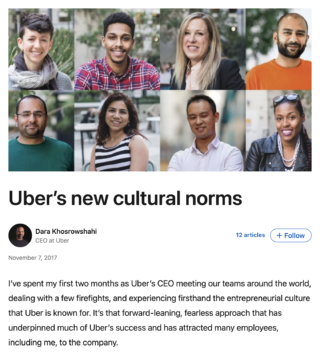
Leveraging values to turn culture around
With the arrival of their new CEO and a clear focus on cultural reform, the organisation sought to make dramatic changes, leveraging their values to spur on this positive change.
Dara was very candid about what needed to be done. He said, “For instance, ‘toe-stepping’ was meant to encourage employees to share their ideas regardless of their seniority or position in the company, but too often it was used as an excuse for being an asshole.”
But what’s important to highlight here is that Uber looked to their employees for ideas, and it’s reported that more than 1,200 employees submitted ideas, which were voted on more than 22,000 times. Not to mention the focus groups they ran across their international offices.
“I feel strongly that culture needs to be written from the bottom up,” he said in his post. “A culture that’s pushed from the top down doesn’t work, because people don’t believe in it.”

Notably, they shifted from calling them “values”, to “cultural norms”, as they expected them to morph and change as the business grew and they needed to promote different behaviours or mindsets along the way.
Late in 2017, they introduced their new cultural norms, which emphasized customer obsession, inclusivity, and a commitment to doing the “right thing”. They represented a clear recognition by Uber that the company needed to prioritize the needs of its customers and create a more supportive and diverse workplace culture.
Making further adjustments to their direction
But this wasn’t the end of the road, as Uber have continued to leverage company values to drive behavioural changes within their organisation as recently as October 2021. This time, Nikki Krishnamurthy, Chief People Officer at Uber said:
“At Uber we’re reimagining the way the world moves for the better…as our mission became clearer over the last few years, so did our understanding of what it takes for us to be successful. Because of this, we refreshed our cultural values to better reflect what it’s like to work at Uber today and the mindsets we all need to deliver on our ambitious mission.”
Leveraging brand values for success (finally)
Uber may have had its fair share of scandals and controversies over the years and still has a long way to go in winning hearts and minds around the world. But, at the very least, the transformation their values have undergone over the last 13 years is a clear signal that they understood and leveraged the power of brand values.
In short then, here’s how they got there:
- Uber identified their challenges and understood the impact that a refined set of brand values could have on their company culture and public perception.
- They appreciated that values need to be authentic, actionable, and ownable to truly drive change and create a positive culture, and crucially, they engaged employees in the creation process, which drove greater alignment and commitment.
- And finally, whether by design or necessity, they recognized that you should continually monitor and evaluate your brand values to ensure they are still driving your business forward. And when necessary, you should adapt and evolve them to meet your needs as your business grows and changes throughout the years.
How we can help you
So, what about your brand values? Are they just empty words on a website page, or are they positively driving your company culture and shaping the way you do business today? Our team of brand and business strategists can help you identify brand values that impact your culture at every touchpoint and deliver results for your business.
